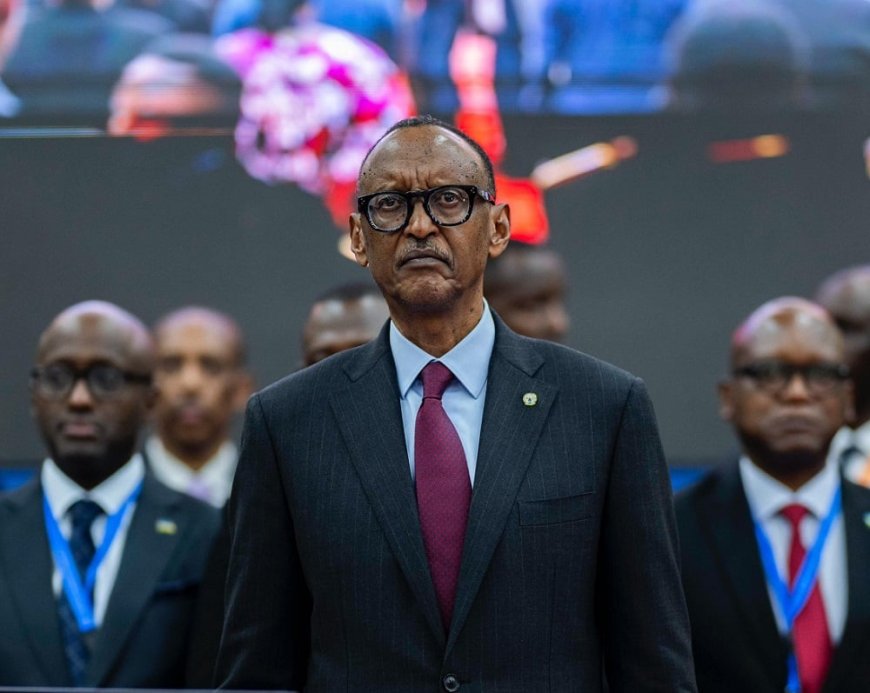President Kagame at EAC-SADC Summit: DRC Cannot Silence Rwanda While Failing to Solve Its Own Problems
President Paul Kagame emphasizes Rwanda’s stance at the EAC-SADC summit, urging the DRC to resolve its internal conflicts and stop creating security problems for Rwanda

Dar-es-Salaam, Tanzania – On Saturday, February 8, 2025, President Paul Kagame of Rwanda issued a powerful statement at the joint summit of the East African Community (EAC) and Southern African Development Community (SADC), focusing on the persistent security crisis in the eastern Democratic Republic of Congo (DRC). During the high-level gathering in Dar-es-Salaam, Kagame asserted that Rwanda will not remain passive as internal conflicts within the DRC lead to security threats for his nation.
The summit, which involved Heads of State from EAC and SADC member nations, sought to establish enduring solutions to the rising violence in eastern DRC, which impacts the region, especially Rwanda. President Kagame’s comments underscored Rwanda’s frustration regarding the DRC’s inability to tackle its internal issues, which have consistently threatened Rwanda’s security and stability.
Kagame’s Key Statements
President Kagame spoke candidly at the summit, stating, “The DRC cannot demand our silence while it creates a security threat for our country. No one can silence us.” He highlighted Rwanda’s enduring attempts to work with the DRC and its leadership to address ongoing issues. “For a long time, we have communicated with the DRC and its leaders about the existing problems and urged them to take action. They have declined to do so.”
Kagame emphasized that the ongoing crisis in eastern DRC is not a result of Rwandan actions. "This war originated from the DRC, and Rwanda was not involved. It has merely been imposed on us, expecting us to claim responsibility," he stated. He urged a change in strategy, encouraging the DRC to recognize the underlying causes of the conflict and to take decisive actions to tackle them.
A Call for Lasting Solutions
President Kagame highlighted the importance of the summit producing concrete solutions rather than remaining merely rhetorical. "We can't afford another meeting reminiscent of the past; we must confront the issues at hand," he stated. He referred to the prolonged ethnic conflict in eastern DRC as one rooted in the disregard for human rights and assaults on Rwanda. "It is essential to acknowledge and uphold human rights while taking meaningful action to address the issues," he stressed.
Kagame’s statements reinforced Rwanda’s view that the DRC’s domestic strife, particularly the activities of armed factions such as the FDLR (Forces Démocratiques de Libération du Rwanda), directly impact Rwanda’s security. He urged the international community and regional leaders to approach the crisis with urgency and a sense of accountability.
The Broader Context
The EAC-SADC summit occurs amidst rising violence in eastern DRC, particularly involving the M23 rebel group and other armed factions. The DRC government has consistently accused Rwanda of supporting the M23, a claim that Rwanda denies. Instead, Rwanda accuses the DRC of collaborating with the FDLR, a militia group connected to the 1994 genocide against the Tutsi in Rwanda.
The summit served as a platform for regional leaders to address these tensions and seek methods to ease the conflict. Nevertheless, President Kagame’s remarks underscored the entrenched mistrust between Rwanda and the DRC, complicating the pursuit of a long-term solution.
Regional Implications
The crisis in eastern DRC has extensive repercussions for the Great Lakes region. The participation of various armed groups, some with cross-border motives, has generated an unstable security situation. The summit's goal was to coordinate the actions of EAC and SADC member states to tackle the crisis together.
President Kagame’s appeal for accountability and human rights found a positive response among many attendees, who acknowledge the importance of a comprehensive strategy to tackle the conflict. Nevertheless, the summit’s effectiveness will hinge on the commitment of all involved, especially the DRC, to confront the fundamental issues underlying the crisis and participate in genuine dialogue.
Conclusion
President Kagame emphasized Rwanda’s dedication to regional stability at the EAC-SADC summit, pointing out the challenges arising from the internal conflicts in the DRC. His appeal for accountability, human rights respect, and sustainable solutions aligns with Rwanda’s overarching goal for peace and security in the Great Lakes region.
As the summit wrapped up, attention turned to executing its resolutions. The international community and regional leaders will closely monitor whether the DRC and other involved parties can effectively tackle the crisis in eastern DRC with the urgency it requires.
 Kinyarwanda
Kinyarwanda
 English
English










































































